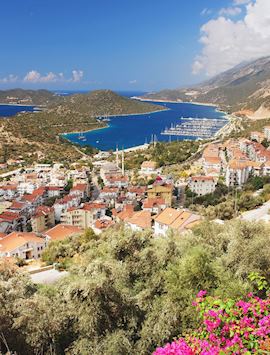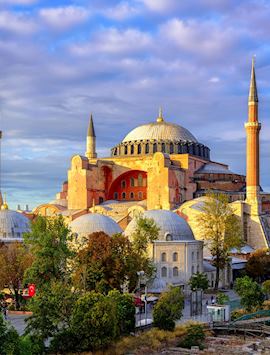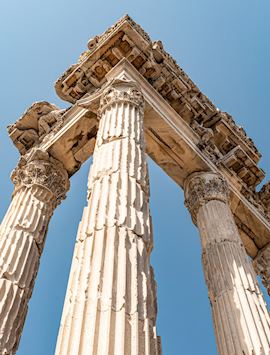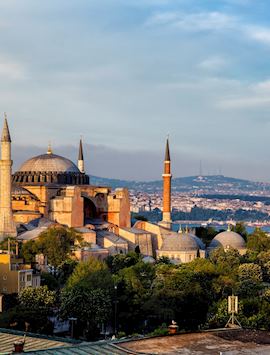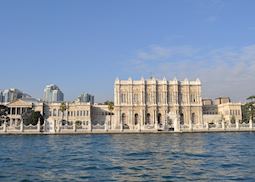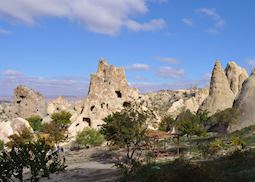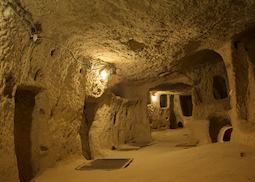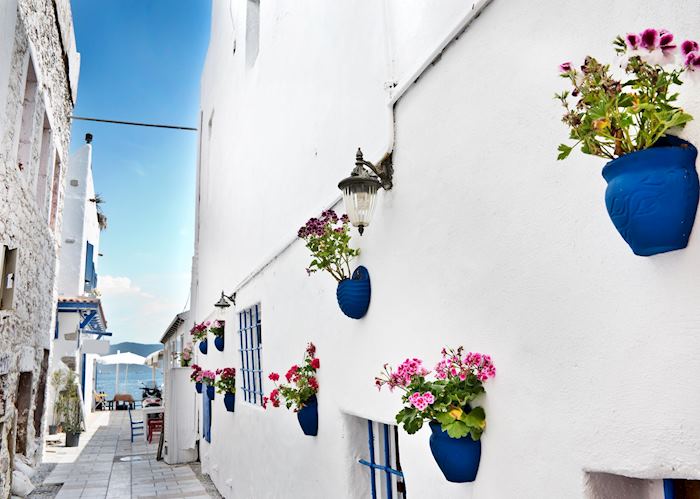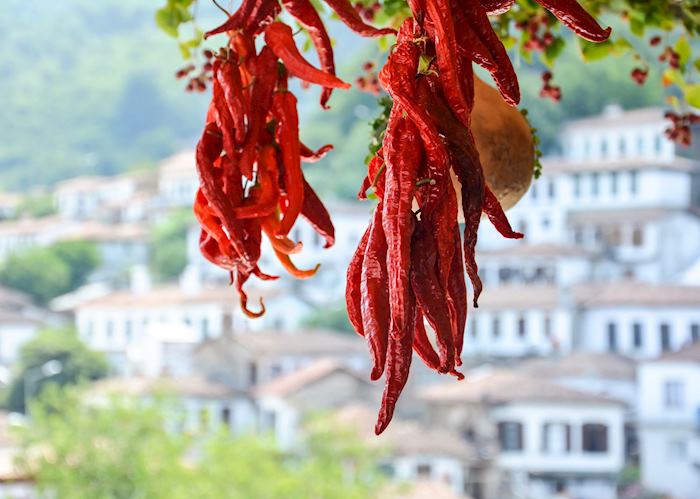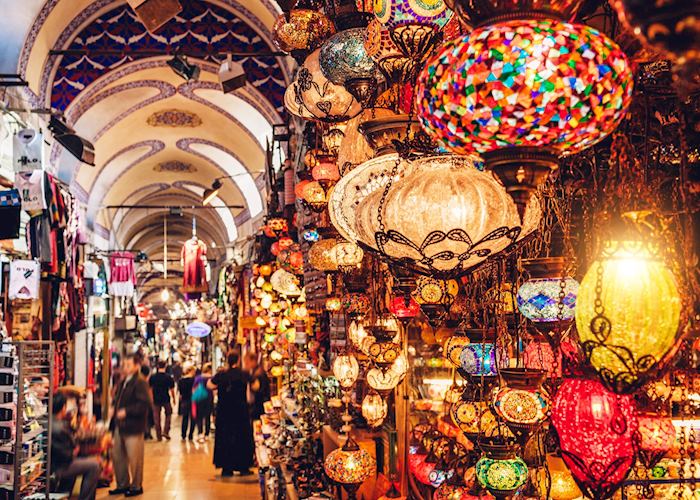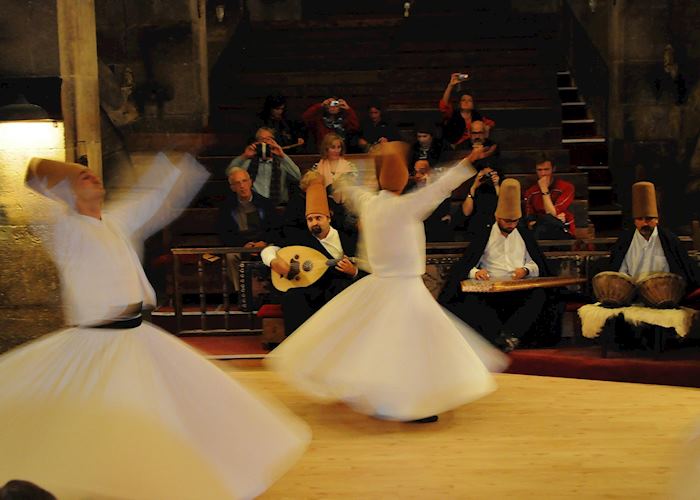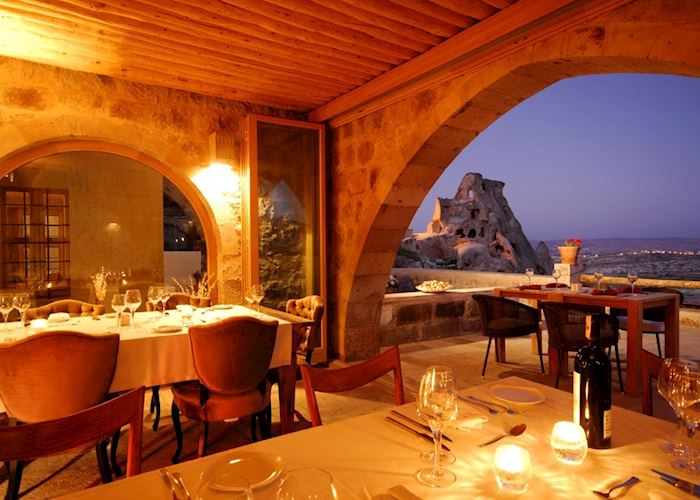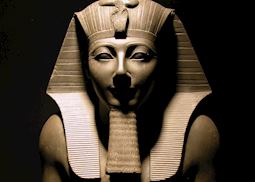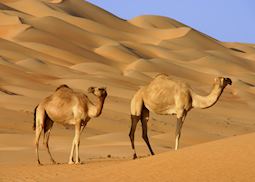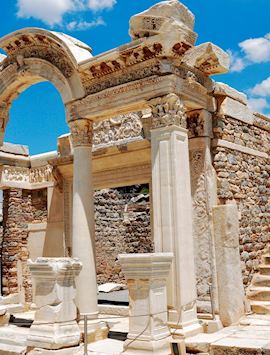
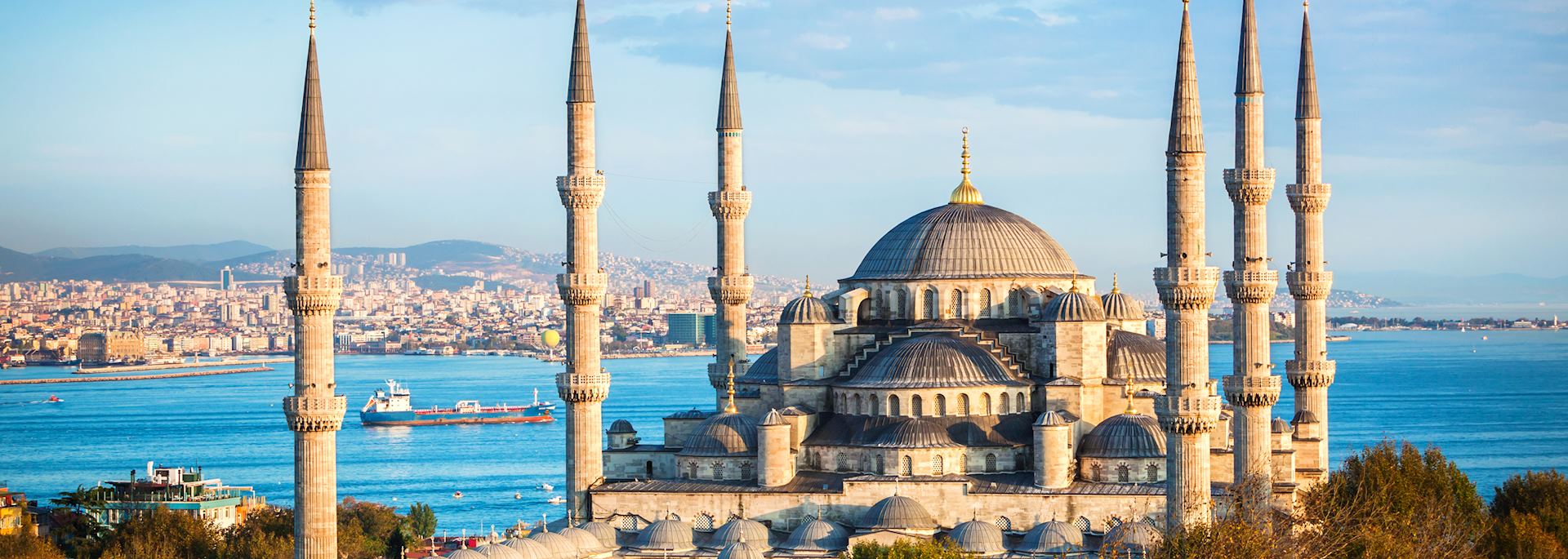
Tailor-made Turkey holidays shaped around your passions
As the meeting point of Europe and the Middle East, Turkey contains a striking diversity of cultures and experiences. In Istanbul, history is palpable in the mosque-spiked skyline — you can tour centuries-old monuments such as the Blue Mosque and Topkapi Palace, before sipping Turkish coffee in the city’s Grand Bazaar. Out in the countryside, tour vineyards and olive groves in the hillside village of Şirince, tasting some of the region’s finest wines. Our specialists have each traversed the country to pick out the best places to visit, activities and hotels, and can share their suggestions when planning your holiday to Turkey.
You could visit Greco-Roman Ephesus, perhaps the best-preserved classical city in the Mediterranean. We also recommend venturing to Cappadocia, in the heart of the country. Here, you can explore an otherworldly landscape of conical rock formations and hills riddled with caves, hiking to hidden monasteries before spending the night in a hotel carved out of the rock.
End your trip on the idyllic Turquoise Coast, swimming in warm, azure waters. Or, balance relaxation in Bodrum’s sheltered coves and pine-clad hills with time exploring the city’s ancient Greek ruins.
Suggested tours for Turkey
These tours give you a starting point for what your holiday to Turkey could entail. Treat them as inspiration, as each trip is created uniquely for you.
Suggested activities for Turkey
Whatever your interests, our specialists will build activities into your trip that connect to how you want to experience Turkey.
-
Bosphorus cruise ![Dolmabahce Palace seen from the Bosphorus, Istanbul]()
Bosphorus cruise
IstanbulBosphorus cruise
Starting from the marina just in front of the Spice Market, your cruise will take you out onto the Bosphorus to view many of Istanbul's different architectural styles.
View details -
Jeep safari ![Cappadocia]()
Jeep safari
CappadociaJeep safari
Taking a jeep safari through the Cappadocian landscape is one of the best ways to see some of its most spectacular scenery and formations.
View details -
Kaymakli underground city excursion ![Kaymakli underground city]()
Kaymakli underground city excursion
CappadociaKaymakli underground city excursion
Explore Kaymakli, one of the best and most accessible of the 200 underground cities within the Cappadocia region.
View details
Why travel with Audley?
- 100% tailor-made tours
- Fully protected travel
- Established for over 25 years
- 98% of our clients would recommend us
Best time to visit
Our specialists advise on the best months to visit Turkey, including information about climate, events and festivals.
Request our brochure
Covering all seven continents, The World Your Way shows you how you can see the world with us. It features trip ideas from our specialists alongside hand-picked stays and experiences, and introduces our approach to creating meaningful travel experiences.
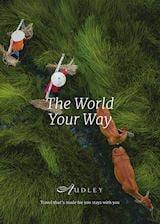
Useful information for planning your holiday in Turkey
The official language of Turkey is Turkish. You may also hear Armenian, Arabic, and various Balkan languages spoken during your visit. English is widely spoken in major visitor destinations, too.
The currency of Turkey is the Turkish lira (TRY). Visa and Mastercard are accepted in all hotels and most restaurants, as well as in larger shops. ATMs can be found in cities and most larger towns.
When in Turkey, you should try lahmacun (flatbread topped with spiced minced meat), dolma (stuffed grape leaves), and börek (filo-like pastry stuffed with feta, minced meat, or vegetables). You’ll also find many dishes that you may already be familiar with, such as hummus, doner kebabs, and sweet, sticky baklava.
Turkish cuisine generally has a heavy emphasis on vegetables making dining options for vegetarians straightforward. Typically, a meal begins with meze, usually including salads, fresh bread, and dips such as hummus, acuka (a spicy pepper and walnut paste), and ezme (a blend of tomato, garlic, and parsley).
Turkish coffee is renowned for its intensity, tea is generally served without milk, and you can often buy fresh juice from street food stalls. Turkey is one of the largest grape producers in the world and you’ll find many local wines, while Efes, the national beer, is named after the ancient city Ephesus.
In Turkey, you should tip around 10% in a restaurant. Tipping is very much a part of Turkish culture, and you should be prepared to tip guides, drivers, and porters, too. We can provide more specific tipping guidance for your trip before you travel.
For the latest travel advice for Turkey, including entry requirements, health information, and the safety and security situation, please refer to the Foreign, Commonwealth & Development Office website.
In Turkey, you can explore well-preserved Greco-Roman cities and ornate mosques, visit spice markets and bazaars, tour the Gallipoli battlefields, learn to cook traditional cuisine in a local home, or relax along the Turquoise Coast.
Turkey offers a myriad of immersive experiences, whether you’re interested in history, geology, art, food, or nature. You can hike to hidden monasteries, Greek amphitheatres, and medieval castles, take a hot air balloon flight over the fairy chimneys and rock-cut churches of Cappadocia, or watch the whirling meditations of Sufi dervishes.
Along the coast you’ll find sheltered beaches at the foot of pine-clad hills, vineyards producing excellent wines, and traditional wooden gulets to sail you from cove to cove.
In Turkey, you can stay in luxurious boutique hotels, stylish, modern townhouses, local guesthouses, and even a cave hotel. You’ll find a wide range of options in Istanbul and on the Bodrum Peninsula, with sleek beachfront hotels as well as urban retreats offering pools, a choice of restaurants, and well-tended gardens.
In Cappadocia, you could stay in a rock-cut hotel for a touch of local character, while on the coast you could opt to take a private cruise on a traditional Turkish gulet. For more ideas, browse our collection of places to stay in Turkey.
Most visitors to Turkey combine a visit to the coast with time in Cappadocia, Istanbul, or Antalya. Set on the meeting point of Europe and the Middle East, Istanbul is a fascinating place to explore, its Byzantine and Ottoman-era architecture showcased in the Hagia Sophia, Topkapi Palace, and Blue Mosque.
You’ll find more historical interest in Greco-Roman Ephesus, one of the best-preserved classical cities in the Mediterranean, and in Antalya where the narrow, cobbled streets are flanked by grand Roman-Ottoman buildings.
By contrast, the fairytale landscape of Cappadocia with its monasteries, cave dwellings, and frescoed churches feels almost otherworldly. You’ll also find UNESCO-protected travertine terraces in Pamukkale, vineyards and olive groves in Şirince, and clear, warm waters, golden sands, and Greek ruins along the Turquoise Coast.
It takes around four hours to fly from the UK to Turkey.
The time zone in Turkey is UTC+3 hours. Turkey does not observe Daylight Savings Time.
The best way to get around Turkey is to combine car journeys with domestic flights. We will arrange for you to have a driver-guide who will take you from city to city and help you gain further insight into the places you visit. For long distances, such as Istanbul to Cappadocia, an internal flight is fast and efficient. For more local journeys, the public bus system can take you to popular sights and attractions close to your hotel.
Use our travel tool to find up-to-date visa and passport requirements for Turkey. Enter where you’re travelling to and from (including any stopover destinations en route or flight layovers), along with your intended travel dates and passport details, for a full list of requirements.
Your doctor can provide you with vaccine advice for Turkey, but you should also ensure you’re up to date with the recommended vaccinations for your home country. You can also check the suggested vaccinations on the Travel Health Pro website.
In Turkey, you should wear long, loose clothing that covers the shoulders and knees, especially when visiting more conservative rural areas. It’s also a good idea to bring some warmer layers if you’re planning to visit Cappadocia. Beachwear is fine along the coast, but you should cover up in public everywhere else.
You can visit mosques in Turkey, but you should follow some basic rules when doing so. It’s essential to dress respectfully and wear clothes that cover your shoulders and knees. Women will also be expected to cover their heads. You’ll also need to remove your shoes at the door.
Turkey’s mosques are often the most impressive buildings in any town or city and generally welcome visitors. However, they’ll be closed to non-Muslim visitors at prayer times.
During Ramadan in Turkey, you should be respectful of others fasting and not eat or drink in public during daylight hours. Although some restaurants will close or change their opening hours, many remain open, and you can eat here during the day as normal. The iftar meal, when observant Muslims break their fast, is often a communal, open-air gathering of friends and families and is a lively part of the day with lots of people sitting outside to eat in parks or public places.
Turkey in pictures
Our expert guides to travelling in Turkey
Written by our specialists from the viewpoint of their own travels, these guides will help you decide on the shape of your own trip to Turkey. Aiming to inspire and inform, we share our recommendations for how to appreciate Turkey at its best.
-
![Turkey with Audley]()
Turkey with Audley
From the stately minarets of the Hagia Sophia and the Blue Mosque, to the preserved Greco-Roman amphitheatre at Ephesus and the glimmering lantern stalls at Istanbul’s Grand Bazaar, our video gives you just a taste of Turkey.
-
An insider’s guide to Istanbul, from the Hagia Sophia to fried-fish sandwiches ![Hagia Sophia]()
An insider’s guide to Istanbul, from the Hagia Sophia to fried-fish sandwiches
An insider’s guide to Istanbul, from the Hagia Sophia to fried-fish sandwiches
Bridging Asia and Europe, Istanbul effortlessly mingles modern commerce and ancient cultures. One-time resident Ninwa introduces you to the city she loves, from the big-name sights like the Grand Bazaar to the best place to buy fish sandwiches right off the boat.
Read this guide -
10 interesting facts about Turkey ![Temple of Hadrian, Ephesus, Turkey]()
10 interesting facts about Turkey
10 interesting facts about Turkey
You probably already know about its Greco-Roman history, delectable cuisines, and Mediterranean coastline, but did you know Turkey is also home to Santa Claus, rich wine regions, and the only city that straddles two continents?
Read this guide



